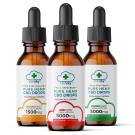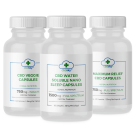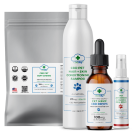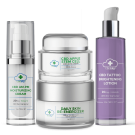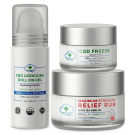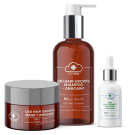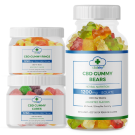If you’re in search of premium CBD products, look no further than CBD SKY, the ultimate one-stop-shop for all your CBD store needs. With a vast range of high-quality options, exceptional customer service, and competitive pricing, CBD SKY is the go-to brand for all types of CBD enthusiasts.
We’re committed to providing you with a wide selection of hemp-derived CBD products that undergo rigorous testing to ensure their safety and efficacy. All products are made from premium quality CBD oil and are free from pesticides, heavy metals, and other chemical solvents.
Our full spectrum cbd products contain all the naturally occurring cannabinoids and terpenes found in the hemp plant, and provide its benefits without any THC. We also offer isolate zero THC products for those who prefer to avoid even trace amounts of THC.
Our wide selection of products includes tinctures, topicals, capsules, gummies, water solubles, soft gels and pet care.
Benefits of high quality CBD for Your Health
Research has suggested that CBD may have several potential health benefits, that includes:
- Supporting a healthy inflammatory response
- Promoting relaxation and reducing stress levels
- Assisting healthy sleep patterns
- Optimizing healthy digestion and appetite
- Increasing healthy immune functions
Why Choose CBD SKY as your cbd store?
Quality products: All our CBD products are made with only the highest quality formulas, including organically grown hemp, and undergo third-party lab testing to ensure their naturally high cbd level and potency.
Broad-spectrum products: Our broad-spectrum CBD products contain phytocannabinoid-rich hemp extract, providing all the benefits of a full-spectrum products without any THC.
Third-party tested: We believe in transparency and provide all our third-party lab results for each product on our website.
Knowledgeable staff members: Our team of experts is always here to answer any questions you may have and provide guidance to help you find the right product for your cbd store needs.
FAQCommon FAQ’s
- What is CBD?
CBD is short for “cannabidiol,” a natural compound unique to cannabis plants. It’s completely non-intoxicating.
“Cannabidiol is a phytocannabinoid discovered in 1940. It is one of 113 identified cannabinoids in cannabis plants, along with tetrahydrocannabinol, and accounts for up to 40% of the plant’s extract” [1]. And, fortunately for consumers of CBD SKY products, there is zero THC after we use nanotechnology to remove all traces of this psychoactive compound from the end product.There are two types of CBD – Here’s what you need to know about both types:
Full-spectrum CBD: CBD Sky products labeled as “full-spectrum” are made using the whole hemp plant. As such, they contain all the naturally occurring compounds in hemp, including cannabinoids, terpenes, and flavonoids. Full-spectrum CBD is preferred by certain individuals over isolates due to the entourage effect they create. The entourage effect is the synergy between the aforementioned compounds.
CBD Isolate: CBD Sky isolates are exactly what they sound like — single molecules which are usually available in a crystal form. They are then powdered and can be infused into a variety of products. And the advantage of isolates is that they have no odor or flavor.
References:
[1] https://en.wikipedia.org/wiki/Cannabidiol
CBD Oil Effects CBD Oil Legal CBD Oil Quality CBD Oil Reviews CBD Oil Uses
- How is CBD different from THC?
THC (Tetrahydrocannabinol), is a psychoactive cannabinoid, while CBD (cannabidiol) is a non-psychoactive cannabinoid. Basically, unlike THC, CBD doesn’t get you “high.” Our bodies contain cannabinoid receptors which are located in different parts of the body.
THC (tetrahydrocannabinol) and CBD (cannabidiol) are in both marijuana and hemp. Marijuana contains much more THC than hemp, while hemp has a lot of CBD.CBD and THC have the same chemical formula: 21 carbon atoms, 30 hydrogen atoms, and two oxygen atoms. The difference lies in the way the atoms are arranged. That gives CBD and THC different chemical properties, and they affect your body differently.
Because of the chemical structure of THC, it is able to bind directly to the CB1 receptor. CBD Oil, on the other hand, does not have this ability. Because of this, THC is able to cause a change in the mental status and this may manifest as euphoria, paranoia, or delirium in excess doses. CBD interacts with the CB1 and CB2 receptors indirectly.
Click on a section below to learn more valuable knowledge about hemp-derived CBD.
CBD Oil Effects CBD Oil Legal CBD Oil Quality CBD Oil Reviews CBD Oil Uses
- How is CBD SKY oil made?
We use Super Critical CO2 extraction to withdraw high-quality organic CBD oil from our premium hemp grown in the USA. By controlling the pressure and temperatures of the CO2, we can separate undesired elements from the CBD with great precision through a cold-pressed, organic process. This extraction method is safe for our health and Mother Nature. Be assured that no pesticides, heavy metals, microbial, solvents are included in our products. Our full spectrum & isolate hemp used for our extracts is cold-pressed and ensures the desired compounds are not overheated or converted into undesirable chemical compounds. Our extracts are Non-GMO, (Pet) Cruelty-free, gluten-free, and vegan-friendly as well.
Find out other helpful information and insights below.
CBD Oil Effects CBD Oil Legal CBD Oil Quality CBD Oil Reviews CBD Oil Uses
- Is CBD safe to consume? Do I need a prescription?
Yes, CBD is safe to consume and no, you don’t need a prescription. Even though you can not overdose on CBD, it is always recommended to consult your health professional before consuming CBD-rich products or before modifying your diet, in any way.
Scientists continue to explore and discover how the endocannabinoid system (ECS) has an imperative role in balancing our health and general functioning.
To review more useful information about hemp-derived CBD, please have a look at these resourceful links.
CBD Oil Effects CBD Oil Legal CBD Oil Quality CBD Oil Reviews CBD Oil Uses
- How is CBD utilized by my body?
As humans, we have cannabinoid receptors are located throughout our bodies, together comprising the endocannabinoid system (ECS) which regulates many critical body functions.
One of the fundamental reasons for utilizing CBD by consumers is that our body is especially open to this compound. This body action is known as “bioavailability”.
Scientists all over the world have discovered that CBD compounds are closely connected to the interaction between cannabidiol (CBD) and the human endocannabinoid system (ECS). And by binding to certain and unique cannabinoid receptors, CBD has been shown in various studies to stimulate these receptors. This, in turn, reportedly enhances the vast majority of the body’s functions. That is, the enhancing of the signaling and function in the central nervous system (CNS).
Take a look at our products to see how they can help you today.
CBD Capsules CBD Oil Drops CBD Oral Spray CBD Pet Care CBD Skin Care
Starting your cbd store Journey
At CBD SKY, we’re committed to providing you with only the highest quality options to support your health and wellness needs. All our products undergo third-party testing to ensure maximum effectiveness, and we’re dedicated to transparency in everything we do.
When you’re purchasing online our team is here to help answer any questions you may have and provide guidance to help you find the right product as your cbd store.
CBD Sky is a trusted cbd store with a great track record that can help you find relief from various health issues. With commitment to quality and customer satisfaction, you can be assured that you’re getting the best products available.
We offer a diverse range of choices that cater to your unique preference through different strengths, flavors, and formulations of products, allowing you to find the perfect solution for your specific needs.
So if you’re looking to improve your health and wellness, give CBD Sky a try and experience the difference it can make for you.
Why usCBD SKY products are backed by a successful track record to optimize the improvement and quality of your life
100% Legally Compliant containing 0% THC – No prescription needed
CBD SKY complies with all USA and many international laws.
Proven customer track record to pass Multi Panel Drug Tests – 0% THC
Highly Rated on Google and Facebook from our REAL customers
QR Codes on Every Label for Increased Transparency

